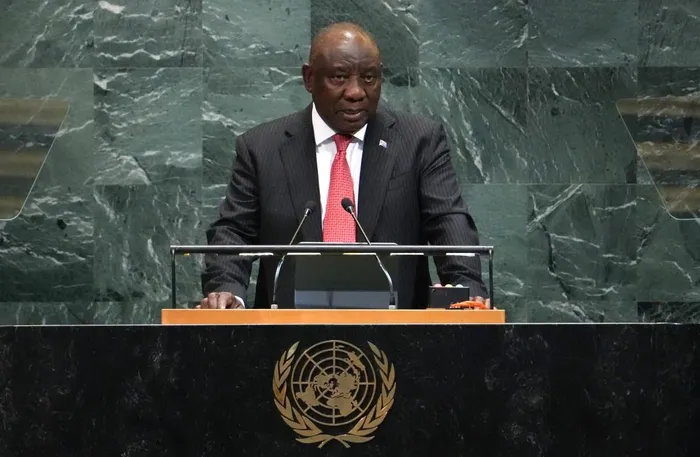
President Cyril Ramaphosa speaks during the General Debate of the United Nations General Assembly at the UN headquarters in New York, United States
Image: AFP
President Cyril Ramaphosa has called for bold international action to protect women, children and adolescents, warning that progress on global health is stalling amid shrinking donor funding, conflict and economic shocks.
Speaking in New York on Tuesday at a high-level Global Leaders Network (GLN) event on the margins of the United Nations General Assembly, Ramaphosa said vulnerable groups were bearing the brunt of the world’s crises.
“Women, children and adolescents – those whose wellbeing defines the future of every society – are bearing a disproportionate burden,” Ramaphosa said.
The Global Leaders Network, which brings together sitting heads of state and government, has placed women’s, children’s, and adolescents’ health at the centre of its agenda. Ramaphosa co-hosted the session with Botswana’s President Duma Boko, who chairs the African Leaders Malaria Alliance.
Ramaphosa said the international community had pledged through the Sustainable Development Goals (SDGs) to end preventable maternal, newborn, and child deaths, and ensure universal access to reproductive health services by 2030. But, he warned, survival gains have stalled since 2015.
“Unless we take bold actions, it is estimated that 60 countries will fall short of meeting the SDG target for under-five mortality and 65 countries will not achieve the target for neonatal mortality,” he said.
He highlighted that over 700 women die every day from preventable causes related to pregnancy and childbirth, many of them adolescent girls.
“Complications from pregnancy, including unsafe abortions, are the leading cause of death among girls aged 15 to 19 years,” he noted.
Ramaphosa said the withdrawal of official development assistance (ODA) for global health had triggered the collapse or scaling back of vital programmes. “Immunisation campaigns are being scaled back. Maternal health services are closing. Adolescent sexual and reproductive health programmes are disappearing. Essential programmes to eliminate malaria have been compromised,” he said.
He warned that the cost of inaction was “staggering, in lost lives and lost potential”. Research, he added, showed that closing the women’s health gap could generate a $1 trillion annual boost to the global economy by 2040.
The South African leader stressed that conflicts and humanitarian crises had compounded the problem, with fragile countries accounting for nearly two-thirds of global maternal deaths in 2023.
Ramaphosa welcomed collaboration between the GLN and the African Leaders Malaria Alliance, announcing that Botswana’s President Boko had proposed a financing mechanism to plug the gap left by declining donor support.
As the Global Leaders Network, Ramaphosa said, governments must recommit to three priorities: increasing investment in global health, achieving universal health coverage, and upholding sexual and reproductive health rights.
“Your presence here today is a powerful signal of commitment to women, children and future generations – those who will drive growth, progress and shared prosperity,” he concluded.
IOL News